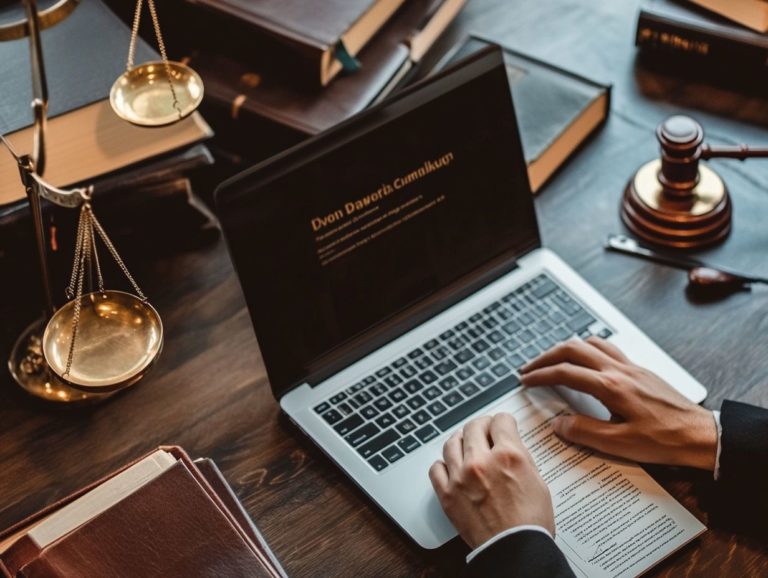What to Bring to Your First Attorney Meeting
Meeting with an attorney for the first time can feel overwhelming, particularly if you re uncertain about what to anticipate or how to prepare effectively.
This guide presents the key steps to ensure your meeting is as productive as possible. From understanding the purpose of your visit and compiling essential documents to formulating the right questions, this resource will equip you with everything necessary to position yourself for success.
By the conclusion, you ll feel assured and ready to navigate the subsequent steps in your legal journey.
Contents
- Key Takeaways:
- Understanding the Purpose of the Meeting
- Preparing for the Meeting
- What to Expect During the Meeting
- Key Questions to Ask Your Attorney
- Next Steps After the Meeting
- Frequently Asked Questions
- What should I bring to my first attorney meeting?
- Can I bring a friend or family member to my first attorney meeting?
- Do I need to bring money to my first attorney meeting?
- Should I bring any personal information to my first attorney meeting?
- What if I don’t have all the necessary documents for my first attorney meeting?
- Is it okay to take notes during my first attorney meeting?
Key Takeaways:

Understand the purpose of the meeting and why you need an attorney in the first place.
Prepare for the meeting by gathering important documents and writing down your questions and concerns.
During the meeting, expect a discussion of case details and an explanation of your legal options.
Understanding the Purpose of the Meeting
The initial consultation with an attorney is an important step in navigating your divorce and child custody issues. It lays the groundwork for a solid attorney-client relationship while clarifying the confidentiality rules that protect your discussions. Attorney-client privilege means your conversations with your lawyer are confidential.
This meeting is not just an opportunity to outline your legal needs; it also serves as a source of emotional support during what can be a tumultuous time. It offers you a secure environment to express your concerns and ask critical questions about the divorce process, ensuring you feel heard and informed as you move forward.
Why You Need an Attorney
Engaging an attorney is essential in divorce matters, as they provide expert legal advice specifically tailored to your situation while safeguarding your rights.
They guide you through the intricate landscape of family law, helping you understand your options and the implications of each decision. Having a skilled attorney also provides emotional support, offering reassurance during a time that can be fraught with anxiety and uncertainty.
You may encounter many myths regarding representation, such as misconceptions about the duration of the process or the associated costs. An experienced lawyer will clarify these issues, equipping you with accurate information to make informed choices.
Ultimately, having a skilled attorney by your side allows for a more streamlined approach to negotiations, custody arrangements, and property division, making the entire experience more manageable and focused on achieving the best possible outcome.
Preparing for the Meeting
Preparing for your initial consultation is crucial for a productive meeting with your attorney. It involves meticulously gathering relevant legal documents, including financial records, personal identification, and existing court orders related to your divorce or child custody matters.
Getting prepared makes the meeting smoother and more effective! This preparation empowers you to engage meaningfully in discussions about your case.
Gathering Important Documents
When you re gearing up for your meeting, gathering essential documents is paramount. This includes relevant legal paperwork like financial statements, tax returns, bank statements, and original documents related to your marriage.
These documents are the building blocks that help your attorney untangle the complexities of your situation. Financial statements offer a snapshot of your current financial health, showcasing assets and liabilities that could play a significant role in your case.
Tax returns provide a historical perspective on your income, critical for issues like child support or alimony. Bank statements can shed light on your spending habits and financial responsibilities. Marriage-related documents think prenuptial agreements or marriage certificates are vital for understanding the legal relationships at play.
By presenting these documents, you empower your attorney to offer customized advice and accurately assess the best strategies moving forward.
Get ready to take control of your legal journey today!
Writing Down Questions and Concerns

Writing down specific questions and concerns before your meeting with an attorney is crucial for ensuring that all your issues are addressed during the initial consultation. This is particularly important for your divorce evaluation.
By outlining relevant questions, you can effectively navigate the complexities of your legal situation. It’s essential to ask about attorney fees upfront. Grasping the financial implications can significantly influence your decision-making process.
Inquiring about various legal options available to you will shed light on potential paths, from mediation to litigation. Discussing expected outcomes will help you set realistic expectations and prepare for the journey ahead.
Thoughtful questions create an informative dialogue. They empower you to make confident choices about your legal representation and strategy.
What to Expect During the Meeting
Expect an in-depth discussion of your case details during your initial meeting. This will address your unique legal needs.
You ll receive a clear explanation of various legal options available to you, all under the promise that your discussions will remain private. This ensures that you feel supported and informed throughout the entire process.
Discussion of Case Details
The discussion of case details during your initial consultation is essential for the attorney to understand your situation better. This initial dialogue should cover a range of specifics, including your marital history, financial standing, and any documents that illustrate asset division or custody arrangements.
Legal documents like prenuptial agreements, financial statements, and existing court orders significantly shape your case. By discussing these elements candidly, you foster trust and clarity in the attorney-client relationship, which is crucial for effective legal representation.
A transparent conversation about your goals and concerns will empower the attorney to devise a well-informed strategy tailored to your unique situation. This ensures you re fully prepared for the challenges that lie ahead.
Explanation of Legal Options
Your attorney will outline the various legal options available to you regarding your divorce and child custody matters, including a discussion of any proposed settlement options.
This guidance is essential, as it equips you to navigate the intricate emotional and legal landscape. You will grasp the implications of each choice.
Options may range from:
- Mediation, which encourages amicable dialogue and compromise,
- Litigation, offering a more structured resolution though it typically comes with a longer timeline and higher expenses.
The impact of custody arrangements will be profound, shaping both your daily life and future relationships. It s vital for you to feel empowered by your decisions, knowing that you have a dedicated legal advocate championing your best interests throughout this journey.
Key Questions to Ask Your Attorney
Make sure to ask the right questions. This will clarify crucial aspects, such as attorney fees, their experience with cases similar to yours, and any follow-up information you might need to provide.
By preparing thoughtful questions and engaging in open discussions, you are taking the right steps toward ensuring positive outcomes for your legal matters.
Clarifying Fees and Payment Structure

Clarifying attorney fees and the payment structure during your initial consultation is essential for ensuring financial transparency. You want to be completely clear on the initial payment and how a trust account, which is a special account where your money is kept safe until needed for legal fees, will be managed throughout your divorce proceedings.
Ask detailed questions about potential hourly rates, flat fees, or contingency arrangements that may pertain to your unique situation. Different attorneys offer varying fee structures; some may require upfront payments through retaining agreements, while others might bill hourly. It’s crucial to understand how costs will accumulate over time.
Watch for extra costs like court fees or expert witness fees. Make sure to clarify whether these will be billed directly to you or deducted from the initial payment.
When you understand these financial aspects, you’ll feel much more at ease during this challenging time!
Understanding the Attorney’s Experience and Approach
Understanding your attorney’s experience and approach is crucial for establishing trust and comfort, especially during a divorce evaluation when emotional support is invaluable.
Inquire about their background to better assess their familiarity with cases similar to yours, which can significantly impact the outcome.
Asking about their methodology will illuminate how they intend to address your unique situation. For instance, some attorneys might favor mediation strategies, while others may opt for a more assertive litigation approach.
Engaging in a conversation about their track record with settlements can also offer insight into their negotiation skills and their ability to navigate complex emotional dynamics.
These discussions clarify their methods and ensure that you feel valued and understood during this challenging period.
Next Steps After the Meeting
After your initial meeting, the next steps will require you to provide any additional information requested by your attorney. Make an informed decision regarding representation, guided by the case assessment conducted during your discussion.
Following Up with Additional Information
Following up with additional information after your meeting is essential for maintaining momentum in your case. It ensures that your attorney has all the necessary client information forms and relevant legal documents to move forward effectively.
This proactive approach showcases your dedication to your legal matters and helps minimize delays in the process. Your attorney may request various types of additional information, such as updates on your personal circumstances or supporting documents that could bolster your position.
Providing emotional support during this time can be immensely beneficial. A supportive environment fosters open communication, giving your legal representative valuable insights that can shape strategy.
By nurturing this relationship, you contribute to a smoother process and empower your case with the nuance and depth it deserves.
Deciding on Representation
Deciding on your legal representation marks a pivotal moment in your journey, solidifying the attorney-client relationship and paving the way for effective collaboration as you move forward, especially after completing the divorce evaluation.
As you navigate this important choice, consider various factors that can significantly influence the outcome of your case.
Experience is paramount; an attorney with a rich background can provide expert guidance through the complexities of legal procedures, particularly in family law, where emotions often run high.
Carefully evaluate the attorney’s fees. Understanding the costs will help you make the best decision for your budget.
Your comfort level with the attorney is equally important, fostering open communication and trust throughout the journey. A strong rapport can ultimately lead to a more favorable resolution, making the attorney’s interpersonal skills just as vital as their legal expertise.
Now that you know what to ask during your initial meeting, take the next step with confidence! Choosing the right attorney can make all the difference in your case.
Frequently Asked Questions

What should I bring to my first attorney meeting?
Bring important papers related to your case. This includes contracts, legal documents, a list of questions, and a form of ID.
Can I bring a friend or family member to my first attorney meeting?
Yes, you can bring someone for support. Choose someone you trust, as conversations with your attorney are private.
Do I need to bring money to my first attorney meeting?
Usually, you don t need to bring money. Confirm if there s a consultation fee or if any upfront payment is required.
Should I bring any personal information to my first attorney meeting?
You don t need to bring sensitive information like your social security number. Your attorney will tell you if they need anything extra.
What if I don’t have all the necessary documents for my first attorney meeting?
If some documents are missing, don t panic. Your attorney can work with what you have and may request more information later.
Is it okay to take notes during my first attorney meeting?
Yes, you can take notes. It helps to write down important points, but always ask your attorney first if it’s okay to do so.






